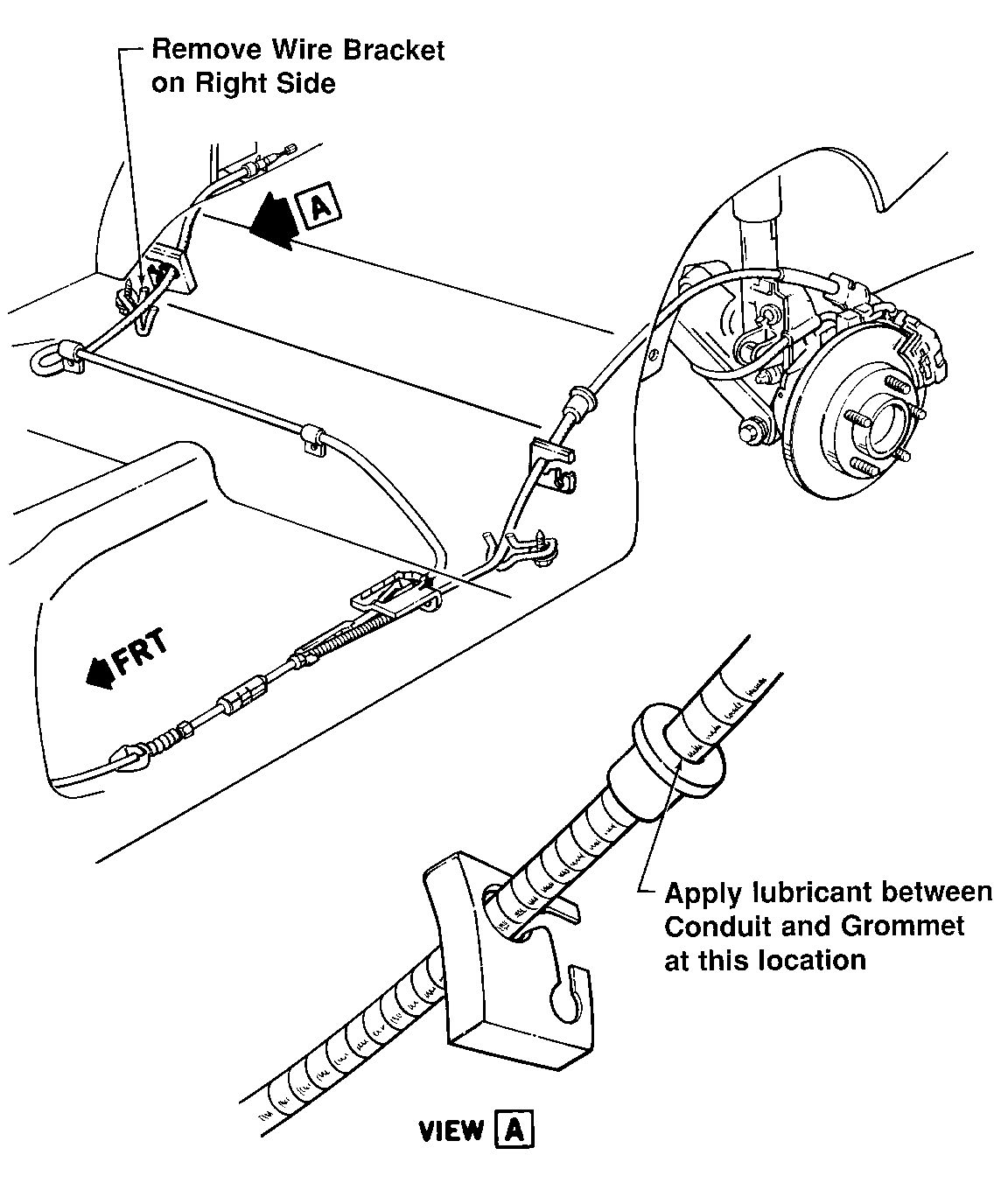REAR UNDERBODY NOISE DIAGNOSIS CONDITIONS & CORRECTIONS

Models Affected: 1988-90 GRAND PRIX
Some 1988-90 Grand Prix models may exhibit various noises emanating from the rear of the vehicle that may be caused by a variety of conditions in the rear suspension, exhaust, fuel or park brake cable systems.
It is the intent of this bulletin to summarize prior issued bulletins and provide insight into other conditions that have been noted to aid in the proper diagnosing of customer noise comments.
When prior published bulletins are referenced, they should be utilized to insure proper service procedures are followed.
SQUEAK/SQUAWK NOISE
Condition: I
Squeaking/squawking during normal suspension/vehicle operation 1988-89 Grand Prix.
Cause: Right hand park brake cable moving through non-required wire bracket installed by assembly plant.
Correction: Remove non-required wire bracket on right side (Reference illustration)
Condition: II
Squeaking during normal suspension/vehicle operation (1988-90 vehicles).
Cause: Park brake cable movement through grommet in cable support brackets.
Correction: Apply lubricant to cables in area of grommets (Reference illustration view A).
Note: For vehicles produced prior to VIN KF 287760, replace the park brake cable with a new size cable PN# 10137374. After replacement, the new cable must be readjusted per the Service Manual. Also this new cable should be greased.
Condition: III
Squawking during normal vehicle operation and most prevalent in cold or wet weather (1988-89 vehicles)
Cause: Auxiliary spring rubbing against edge of spring mounting bracket.
Correction: Remove auxiliary spring per procedure outlined in Service Manual and reinstall with clearance to edge of mounting bracket.
Condition: IV
Squeak and/or clunk noted during normal suspension movement (Early 1988 vehicles Only).
Cause: Defective strut assemblies with date codes 15087-04688 (clunk) and 01688-08688 (squeak).
Correction: Replace struts with the affected date codes. Any other struts that are suspected of being noisy should be bench checked per the procedure outlined in the diagnosis section of the Service Manual. Replace only those struts which exhibit excessive noise during the bench test.
THUD/CLUNK NOISE
Condition: I
Clunk noted during normal suspension/vehicle movements (1988-90 vehicles)
Cause: Exhaust system contacting rear stabilizer bar.
Correction: Inspect exhaust system and stabilizer bar for witness marks due to metal to metal contact. Align exhaust system to provide adequate clearance if interference condition is noted.
Condition: II
Thud noted during extended suspension movement. Condition most apparent when vehicle is turning up parking ramp/driveway or driven over deep chuckhole or speed bump (1988 and early 1989 vehicles).
Cause: Rear struts extend to their maximum travel. Not detrimental to struts but associated noise may be cause of annoyance.
Correction: Replacement of both rear struts and spring plates with interim 1989 components provides additional 10 mm of travel. Component replacement will reduce the potential for occurrence of this condition but may not eliminate it completely and is inherent to suspension design (Reference Bulletin 88-3-30A).
RATTLE NOISE
Condition: I
Metallic rattling during normal vehicle operation or engine run up in neutral (1988-90 vehicles).
Cause: Loose clinch nuts in either exhaust intermediate pipe or underbody hanger brackets.
Correction: Install washer P/N 11500367 between hanger and either or both the underbody and pipe brackets.
Condition: II
Dull rattling noted during normal suspension/vehicle operation (1988-90 vehicles)
Cause: Park brake cable grommets not properly installed in underbody retaining brackets.
Correction: Insure both underbody brackets are not distorted and install cable grommets.
Condition: III
Metallic rattling noted during engine run-up in neutral or normal suspension/vehicle operation. (1988-90 vehicles).
Cause: Loose exhaust system heat shields.
Correction: Inspect and tighten loose exhaust system heat shield fasteners insuring sufficient clearance is maintained.
OIL CANNING/POPPING NOISE
Condition: I
Oil canning/popping noise noted during normal vehicle operation (1988-89 vehicles)
Cause: Normal internal fuel tank pressure results in oil canning noise.
Correction: Replace fuel tank with new service tank, P/N 10140614, that has additional ribbing on upper and lower tank sections (Reference Bulletin 89-6-17)

General Motors bulletins are intended for use by professional technicians, not a "do-it-yourselfer". They are written to inform those technicians of conditions that may occur on some vehicles, or to provide information that could assist in the proper service of a vehicle. Properly trained technicians have the equipment, tools, safety instructions and know-how to do a job properly and safely. If a condition is described, do not assume that the bulletin applies to your vehicle, or that your vehicle will have that condition. See a General Motors dealer servicing your brand of General Motors vehicle for information on whether your vehicle may benefit from the information.
